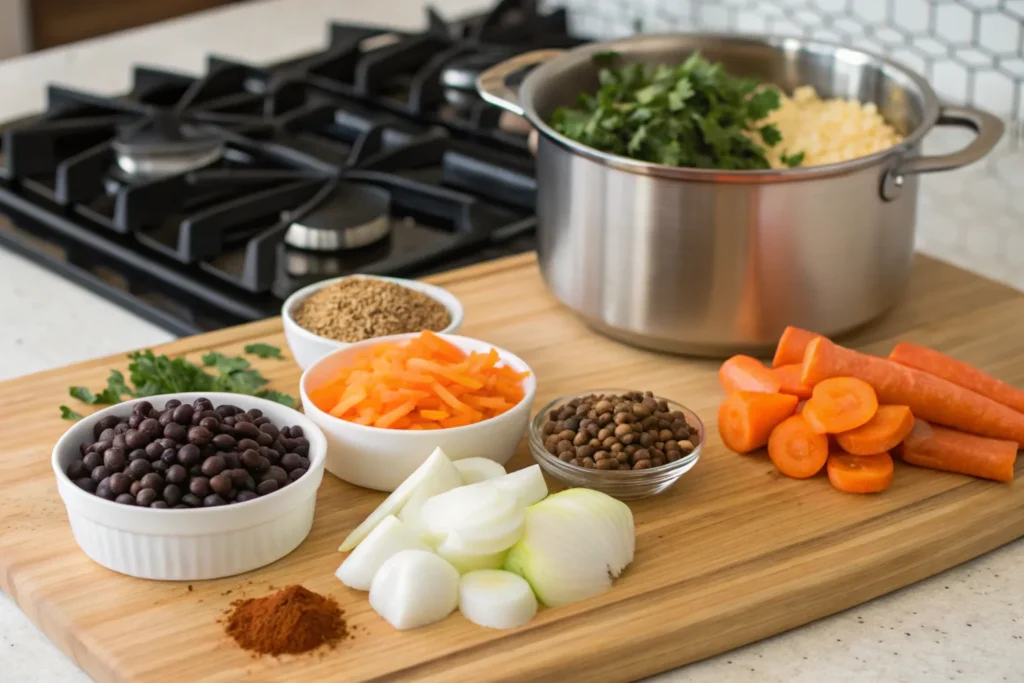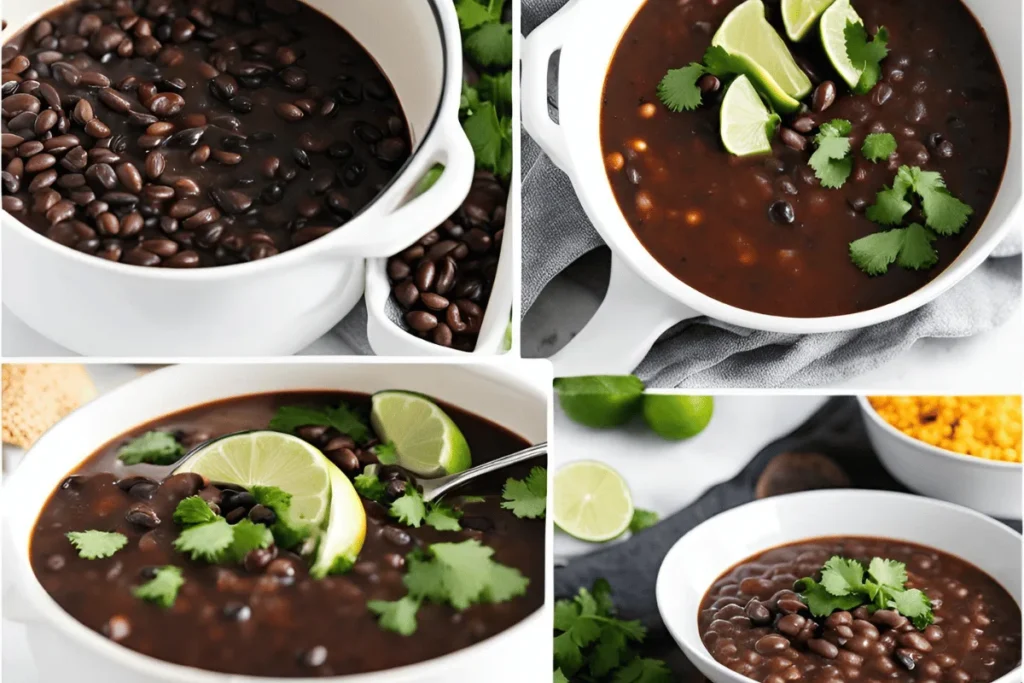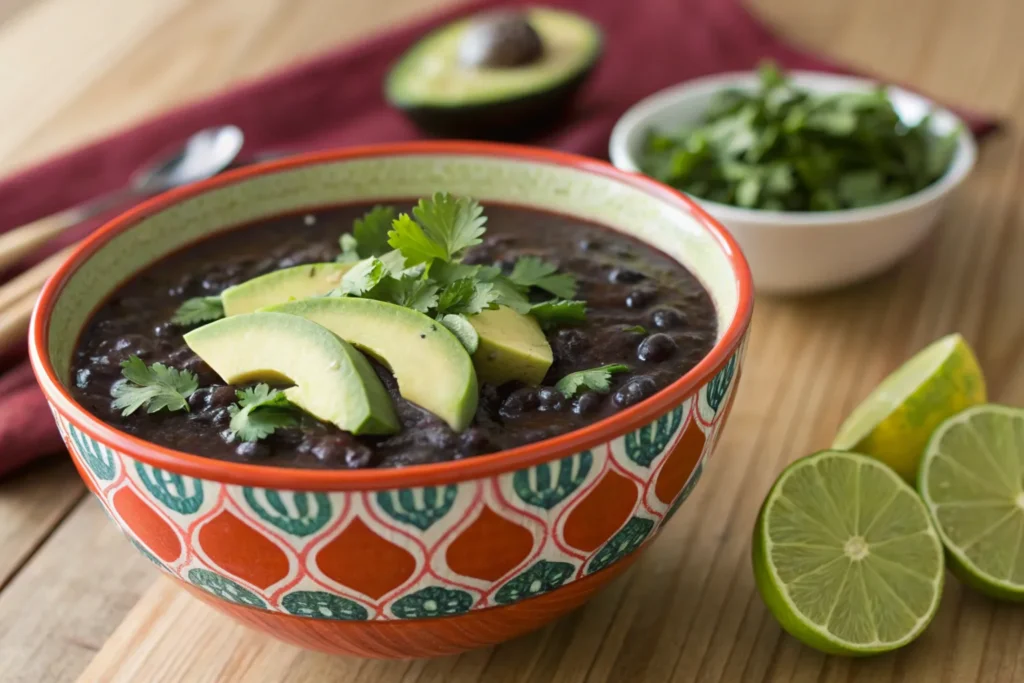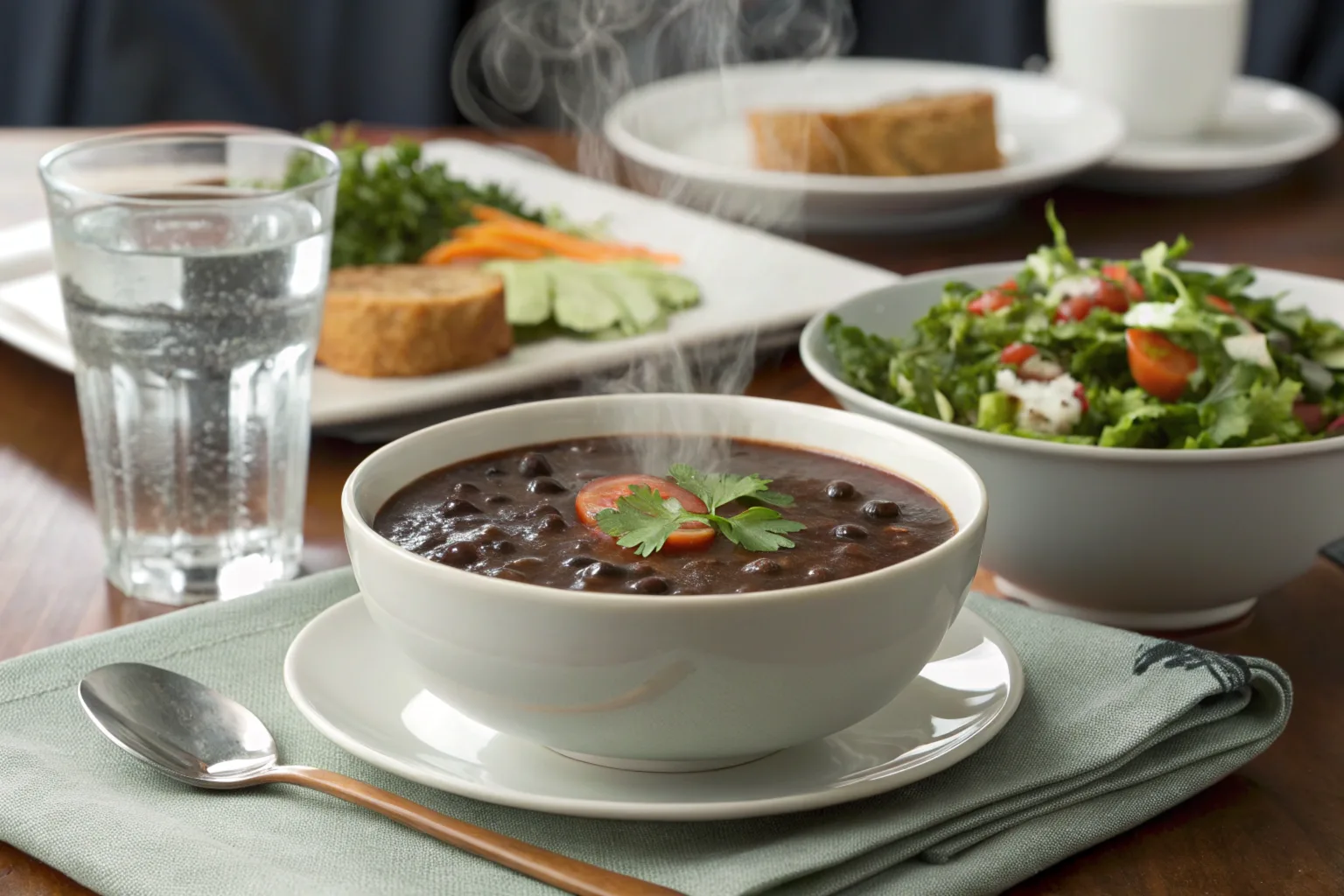When it comes to comfort food, black bean soup is a standout. It’s warm, hearty, and packed with flavor—but is black bean soup good for you? The answer is a resounding yes! This versatile dish isn’t just delicious; it’s loaded with nutrients that can benefit your overall health. Whether you’re looking for a meal to fuel your day or support your wellness goals, black bean soup has plenty to offer.
Let’s dive into the surprising health benefits of black bean soup, explore why it’s a favorite for so many diets, and learn how you can make it even healthier at home.

Nutritional Benefits of Black Bean Soup
Black bean soup is a nutritional powerhouse, providing key nutrients that your body needs to thrive. Here’s why it’s worth adding to your weekly menu.
High in Protein for Muscle and Energy
Black beans are an excellent source of plant-based protein, making this soup a great option for vegetarians and vegans. Protein helps repair tissues, build muscle, and keep you energized throughout the day.
Tip: Pair your black bean soup with a slice of whole-grain bread or a salad like this spicy cucumber salad for a balanced meal.
Packed with Fiber for Digestion and Heart Health
Each serving of black bean soup is rich in dietary fiber, which supports healthy digestion and keeps you feeling full longer. Fiber also helps lower cholesterol levels, reducing the risk of heart disease.
A Good Source of Essential Vitamins and Minerals
Black beans are loaded with vitamins like folate and minerals such as magnesium, potassium, and iron. These nutrients play critical roles in energy production, bone health, and maintaining normal blood pressure.
Low in Fat and Rich in Antioxidants
Black bean soup is naturally low in fat, and the beans themselves are packed with antioxidants like anthocyanins, which help protect your cells from damage caused by free radicals.
Nothing beats a bowl of hearty soup, especially when it’s packed with flavor. Discover this ‘marry me’ chicken soup recipe that might just win hearts at the dinner table
Health Benefits of Eating Black Bean Soup Regularly
Including black bean soup in your regular diet isn’t just tasty—it’s also a smart choice for your health. Let’s explore some of the key benefits this nutritious dish offers.

Supports Heart Health
The high fiber content in black beans helps lower bad cholesterol levels, reducing the risk of heart disease. Plus, the potassium and magnesium in black bean soup help regulate blood pressure, keeping your cardiovascular system in check.
Helps Manage Blood Sugar Levels
Black beans have a low glycemic index, meaning they release energy slowly and help prevent blood sugar spikes. This makes black bean soup an excellent choice for those managing diabetes or aiming for steady energy throughout the day.
Tip: Pairing black bean soup with healthy fats like avocado can further stabilize blood sugar levels while adding delicious flavor.
Boosts Gut Health
The fiber in black beans acts as a prebiotic, nourishing the healthy bacteria in your gut. A well-balanced gut microbiome supports digestion, improves nutrient absorption, and strengthens your immune system.
Aids in Weight Management
With its high protein and fiber content, black bean soup keeps you full for longer, helping to curb unnecessary snacking. It’s a nutrient-dense, low-calorie meal option that’s satisfying and wholesome.
Related: If you’re exploring healthier eating habits, this guide on sourdough vs. regular bagels is a fun read to understand the benefits of different food choices.
Is Black Bean Soup Suitable for All Diets?
One of the best things about black bean soup is its versatility. Whether you follow a specific diet or have dietary restrictions, black bean soup can often be adapted to meet your needs. Let’s look at some common questions about its compatibility with different diets.

Is Black Bean Soup Vegan and Vegetarian-Friendly?
Absolutely! Black bean soup is naturally vegan and vegetarian as long as you skip any animal-based broths or toppings like sour cream. Opt for vegetable broth and plant-based garnishes like avocado or vegan yogurt to keep it plant-friendly.
Tip: For more on how black beans fit into plant-based cooking, check out this guide on should you drain black beans for soup.
Is Black Bean Soup Gluten-Free?
Yes, black bean soup is naturally gluten-free, provided you use certified gluten-free broth and avoid any gluten-containing additives. Always double-check labels if you’re preparing the soup for someone with gluten sensitivities.
Can Black Bean Soup Be Made Low-Sodium?
If you’re watching your sodium intake, black bean soup is easy to adjust. Use low-sodium canned beans or homemade beans, and choose a low-sodium broth. You can season the soup with fresh herbs, garlic, and spices for added flavor without relying on salt.
Is Black Bean Soup Keto or Low-Carb Friendly?
Black beans are relatively high in carbs, so traditional black bean soup may not fit a strict keto diet. However, you can modify the recipe by reducing the portion of beans and adding low-carb vegetables like zucchini or cauliflower.
How to Make Black Bean Soup Even Healthier
Black bean soup is already a nutritious choice, but a few tweaks can boost its health benefits even further. Here’s how you can take your soup to the next level.
Add More Vegetables for Extra Nutrients
Incorporate nutrient-dense vegetables like carrots, bell peppers, spinach, or kale to enhance the flavor and nutritional profile of your soup. Vegetables provide essential vitamins, minerals, and fiber, making the soup even more filling and healthy.
Tip: Adding a side like this spicy cucumber salad complements the soup beautifully while increasing your vegetable intake.
Use Homemade Broth to Control Sodium
Store-bought broths can be high in sodium, so making your own broth at home gives you full control over the salt content. Homemade broth also brings a richer, more natural flavor to the soup.
Experiment with Spices for Flavor Without Calories
Spices like cumin, smoked paprika, and chili powder can add depth to your soup without adding extra calories. Fresh herbs like cilantro or parsley also provide a burst of flavor while offering additional health benefits.
Top with Healthy Ingredients Like Avocado or Greek Yogurt
Toppings can elevate both the taste and nutrition of your soup. Avocado provides healthy fats, while a dollop of Greek yogurt adds protein and creaminess. For a crunchier texture, sprinkle toasted pumpkin seeds or nuts on top.
FAQs About Black Bean Soup and Health
Black bean soup is rich in protein, fiber, vitamins, and minerals, making it a nutritious and filling meal. It supports heart health, improves digestion, regulates blood sugar levels, and provides antioxidants that help protect against cell damage.
Black beans are a powerhouse of nutrition. They provide energy, support muscle repair, improve gut health with their high fiber content, and help maintain stable blood sugar levels. The antioxidants in black beans also protect your body from free radicals.
Yes, eating bean soup daily can be healthy, as long as it’s part of a balanced diet. Bean soup provides essential nutrients like protein and fiber. However, be mindful of sodium content and portion sizes, especially if you’re using canned beans or store-bought broth.
While no single food directly burns belly fat, black beans can aid in weight management. Their high protein and fiber content help you feel full longer, reducing overall calorie intake. Combined with regular exercise and a healthy diet, black beans can support weight loss goals.
Canned black beans are a convenient and nutritious option. They retain most of their nutrients, like protein and fiber, but can be high in sodium. Rinse canned beans thoroughly to reduce sodium levels before adding them to your soup.
Bean soup provides a wealth of health benefits. It improves digestion, boosts energy levels, supports heart health, and helps maintain healthy blood sugar levels. Its combination of protein, fiber, and complex carbohydrates makes it a satisfying and nourishing meal.
Conclusion
So, Is black beans soup good for you? Absolutely! This hearty and flavorful dish is packed with protein, fiber, vitamins, and minerals that support your overall health. From promoting heart health to improving digestion and helping with weight management, black bean soup is a versatile and nutritious addition to your diet.
What’s even better is how adaptable black bean soup can be. Whether you’re vegan, gluten-free, or looking to reduce sodium, there’s a way to customize this soup to suit your needs. With simple additions like more vegetables, homemade broth, and healthy toppings, you can make it even more nourishing.
If you’re ready to try your hand at a delicious recipe, check out this classic black bean soup. Pair it with a spicy cucumber salad for a refreshing side, or explore more tips on why black bean soup might taste bitter and how to fix it.
Enjoy your cooking journey, and remember—every bowl of black bean soup is a step toward a healthier, happier you!

